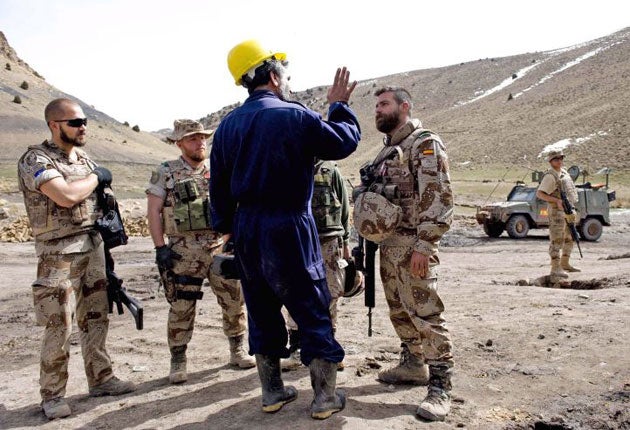Report: US finds mineral riches in Afghanistan

Your support helps us to tell the story
From reproductive rights to climate change to Big Tech, The Independent is on the ground when the story is developing. Whether it's investigating the financials of Elon Musk's pro-Trump PAC or producing our latest documentary, 'The A Word', which shines a light on the American women fighting for reproductive rights, we know how important it is to parse out the facts from the messaging.
At such a critical moment in US history, we need reporters on the ground. Your donation allows us to keep sending journalists to speak to both sides of the story.
The Independent is trusted by Americans across the entire political spectrum. And unlike many other quality news outlets, we choose not to lock Americans out of our reporting and analysis with paywalls. We believe quality journalism should be available to everyone, paid for by those who can afford it.
Your support makes all the difference.A team of US geologists and Pentagon officials has discovered vast mineral wealth in Afghanistan, conceivably enough to turn the scarred and impoverished country into one of the world's most lucrative mining centres, The New York Times reports.
"There is stunning potential here," General David Petraeus, commander of the United States Central Command, told the paper in a report published today. "There are a lot of ifs, of course, but I think potentially it is hugely significant."
Americans discovered nearly $1 trillion in untapped mineral deposits in Afghanistan, including iron, copper, cobalt, gold and critical industrial metals like lithium, according to the report. The Times quoted a Pentagon memo as saying Afghanistan could become the "Saudi Arabia of lithium," a key raw material in the manufacture of batteries for laptops and mobile phones.
During a visit last month to Washington, Afghan President Hamid Karzai said his nation's untapped mineral deposits could be even higher — perhaps as much as $3 trillion.
The mineral resources are a "massive opportunity," Karzai said at 13 May event with Secretary of State Hillary Clinton held at the US Institute of Peace.
The report in the Times said the US Geological Survey began aerial surveys of Afghanistan's mineral resources in 2006, using data that had been collected by Soviet mining experts during the Soviet occupation of Afghanistan in the 1980s. Promising results led to a more sophisticated study the next year.
Then last year, a Pentagon task force that had created business development programs in Iraq arrived in Afghanistan and closely analyzed the geologists' findings. US mining experts were brought in to validate the survey's conclusions, and top US and Afghan officials were briefed.
Waheed Omar, Karzai's spokesman, said at a news conference today that the USGS was "contracted by the Afghan government to do a survey, so this is basically an Afghan government initiative."
"I think it's very, very big news for the people of Afghanistan and that we hope will bring the Afghan people together for a cause that will benefit everyone," he said. "This is an economic interest that will benefit all Afghans and will benefit Afghanistan in the long run."
So far, the biggest mineral deposits discovered are of iron and copper, but finds include large deposits of niobium, a soft metal used in producing superconducting steel, as well as rare earth elements and large gold deposits in Pashtun areas of southern Afghanistan, the report said.
Charles Kernot, a mining analyst with Evolution Securities Ltd. in London, said it typically takes three to five years to get a lithium mining operation up and running. Factors include how close the deposit is to power sources and other infrastructure and the size of the deposit.
And large lithium deposits may not mean an automatic windfall — given competition and the uncertainty of the market.
"Bolivia wants to expand its lithium mining operations dramatically over the next few years so there is a risk of oversupply if demand from electric cars does not meet expectations," Kernot said.
Ghazni Province, where the lithium deposits are reported to be, is a dangerous place, home to many Taliban.
Join our commenting forum
Join thought-provoking conversations, follow other Independent readers and see their replies
Comments